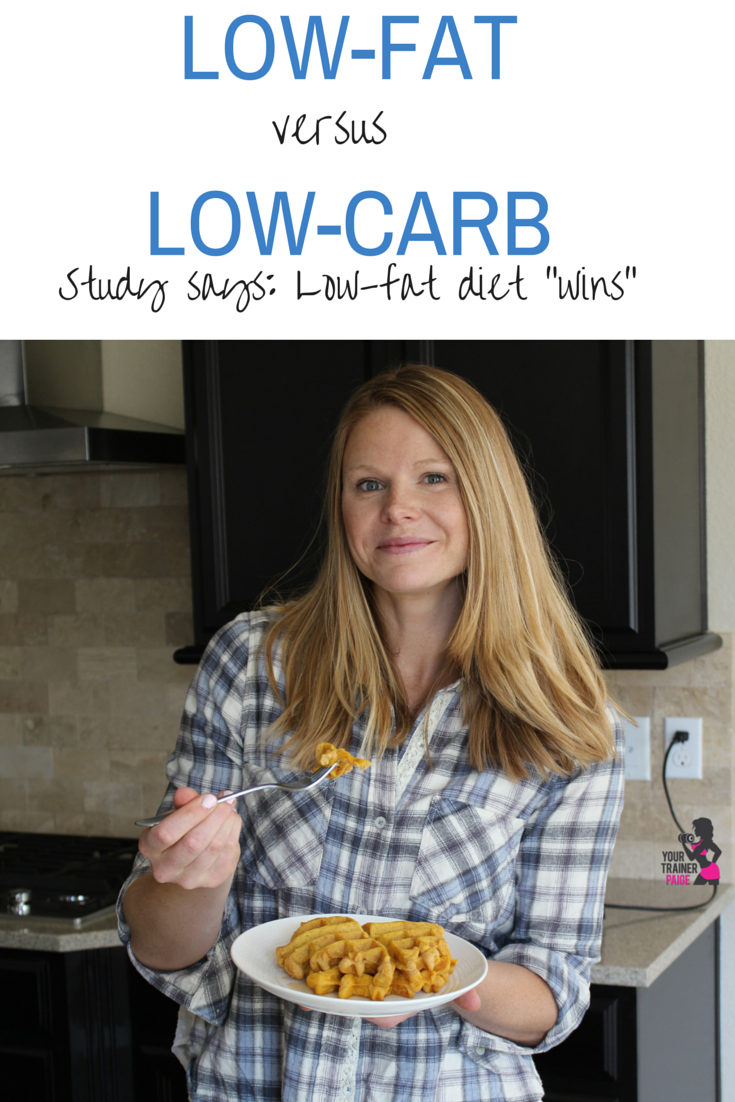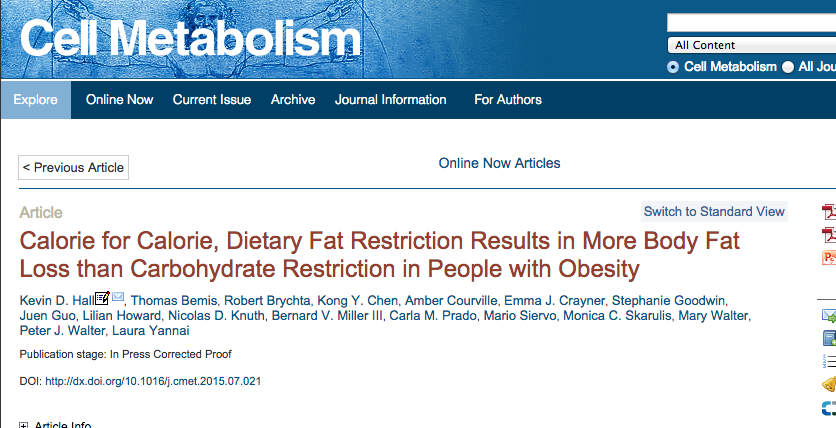Some thoughts and discussions from me.

When I first started working in the fitness and health industry in 2008, I learned one thing to be true above all else: you can’t say anything as a fact and be 110% sure.
Why? Well, for one thing, research is constantly changing, and for another, sometimes research is wrong!
A new study was published on Cell Metabolism on August 13th concluding that dietary fat restriction results in more body fat loss than carbohydrate restriction in obese individuals.

[Tweet “Study says: Low-Fat Better Than Low-Carb for Fat Loss? via @TrainerPaige”]
The National Institute of Diabetes and Kidney Diseases studies 19 non-diabetic men and women for two weeks, and split them into two groups.
They initially fed the participants a baseline diet for five days. They then lowered both groups total caloric intake by 30% – but restricted fat in one group, and carbs in the second group, and then switched for the second week.
After the study, they found that even though carbohydrate restriction lowered insulin, which is said to be a fat-regulating hormone, and increased fat burning, the participants lost more body fat during the fat-restricted diet phase in both groups.
In fact, restricting dietary fat led to a 68% higher body fat loss rate than restricting the same amount of carbohydrate calories.
[Tweet “New study: restricting dietary fat over carbohydrates led to 68% higher body fat loss rate – via @trainerpaige “]
What’s Wrong with This Study?
Look – I’ll be honest, here: when this study first popped into my feed, I think I quite literally SMH (smacked my head.) Another research perpetuating restriction?! Are we going to revert back to the low fat trend of the 1990’s?! When will it end?
(Actually…the first thought after seeing the title of this post was: Uh oh! The IIFYM vs. Paleo battle is going down! 😉
Then after my initial gut reaction settled down, I did appreciate the study for what it was: a better insight onto how to decrease the obesity epidemic that we have here in the US.
Because when it comes down to it, more than 65% of adults are considered overweight or obese, and studies on how to better control weight gain can be helpful.
It’s the media that takes these studies, blows them up, and then runs with it that causes the problems. It’s the money-hungry companies that see this as an opportunity to prey on the vulnerable by modifying the food to fit what the media says is good.
That said, there are a few things missing from this study, as far as I can tell:
The participants’ age –
- it mentioned 19 men and women, but didn’t say the age range of the individuals
Underlying health conditions?
- It said the participants did NOT have diabetes, but it didn’t mention any other health conditions that they might or might not have had.
The length of the study
- – This is the most obvious factor, in my opinion, and the study actually even said that
it predicted the difference of body fat loss when restricting fat vs. restricting carbs to be minimal, when it came to long-term differences.
Bottom Line
Along with the opinions I mentioned above, I think fat loss is a HIGHLY individual subject, and completely depends on a number of factors of the individual, from their lifestyle to their preferences to their metabolic makeup. As a fitness coach, I work with my clients’ macronutrient needs based off of a number of factors, and not one of my clients have the same-looking nutrition program. It’s all about what works for YOU and your body.
[Tweet “fat loss is a HIGHLY individual subject, and completely depends on a number of factors of the individual – via @TrainerPaige”]
Additionally, this is clearly a very new study. I’m sure there will be much more research to come regarding this topic in the future.
So, I encourage you to take this study with a grain of salt, and to work with someone who can help you determine a baseline nutrition plan for you. Not what’s worked for them, someone else, or a group of people, but YOU as an individual.
Tell me: Have you ever followed a low-fat/low-carb/other type of diet?
I’ve never done any intentionally, but when I had my (very) brief stint with the paleo world, I ate way to few carbohydrates for my body.



I saw an interesting documentary on the whole fat vs sugar issue a while ago (I think it was on BBC) in which two doctors (twins) go on a high-carb / high-fat diet to see which is worse. The conclusion was that it’s not fat or sugar,, it’s the combination of the two that poses the real threat. Apparently a 50/50 mixture of fat and sugar (like ice cream or donuts) is very addictive to us humans. It’s this mixture which leads to overeating and obesity.
Ren @ FitPlaza recently posted…Metabolic Cooking Recipes – A Workout For Your Metabolism
Interesting!! I’ve heard that the combination of fat + sugar can be addictive – from how it tastes on our tastebuds to how it affects our brain chemistry. This stuff is just so interesting to me.
I LOVE MY FATS and I am not getting rid of those fats anytime soon! HA! I have actually increased my fats in the past few months and love the added benefits that it has helped not only my appetite, but also my skin, and overall wellness. Interesting article and thanks for writing about it!
She Rocks Fitness recently posted…She ROCKS Leg and Core Workout
Agreed! But…I also love my carbs 🙂 haha
Thanks for popping in, girl! Hope you’re doing well xoxo
I cannot survive without healthy fats in my diet and some carbs. I do have to be careful not to eat too many carbs especially now that I do not run very much. My Mom had bypass surgery last year. Her cardiologist put her on a low fat diet. She’s eating all this low fat processed crap loaded with sugar. I told her to ask her doctor about her sugar intake. I’m not a doctor, but I personally don’t agree that a low fat diet is necessarily the right answer for everyone. I know for myself I quickly fall of the wagon because I’m left starving without fat and I’ve been successful in maintaining my weight loss eating a lot of fat (healthy nut butter jar!).
It does seem like many doctors out there have very little nutrition knowledge! Is she also working with an RD?
I am currently doing carb cycling to lose some baby weight and weight I gained from a defunct thyroid before getting pregnant. I have lost almost 20 pounds of that weight, but I am beginning to really end up hungry at points during the day and missing carbs on days when I am keeping them low. So I know I need to re-evaluate and see what works for me!
I LOVE that you posted re: fats and carbs in the diet. Ive been dabbling around in it myself. I usually stick with a much higher carb than fat ratio daily and don’t fluctuate that much. I do feel clean carbs are a must for my strength training and daily energy levels. BUT… I have noticed lately that my skin/hair appears dry and have tried cycling days with higher fats. Im talking more yummy avocados, whole eggs, coconut oil, salmon, almond butter etc. I have felt more satiated during those days and can get by with 3 good, whole square meals, less snacking. I personally work best cycling between the 2. Everyone’s body is a different machine! Just gotta test and try for yourself! 🙂